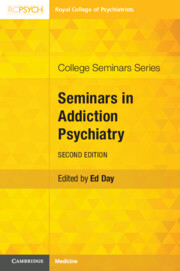Book contents
- Seminars in Addiction Psychiatry
- College Seminars Series
- Seminars in Addiction Psychiatry
- Copyright page
- Contents
- Contributors
- Preface
- Chapter 1 Historical and Conceptual Approaches to Addiction
- Chapter 2 Illicit Drug Use: Epidemiology, Aetiology and Prevention
- Chapter 3 Illicit Drug Use: Clinical Features and Treatment
- Chapter 4 Addiction to Prescription Medication: Benzodiazepines, Z-Drugs and Gabapentinoids
- Chapter 5 Alcohol Use Disorders: Epidemiology and Prevention
- Chapter 6 Alcohol Use Disorders: Aetiology and Pathophysiology
- Chapter 7 Alcohol Use Disorders: Clinical Features and Treatment
- Chapter 8 Psychological Approaches to Addiction
- Chapter 9 Comorbid Substance Use and Mental Illness
- Chapter 10 Medical Aspects of Drug and Alcohol Use
- Chapter 11 Organising Treatment Services for Drug and Alcohol Misusers
- Chapter 12 Tobacco Use Disorders
- Chapter 13 Novel Psychoactive Substances and Club Drugs
- Chapter 14 Addiction Problems in a Family and Social Context
- Chapter 15 Addiction Recovery Mutual-Aid Organisations
- Index
- References
Chapter 1 - Historical and Conceptual Approaches to Addiction
Published online by Cambridge University Press: 02 November 2021
- Seminars in Addiction Psychiatry
- College Seminars Series
- Seminars in Addiction Psychiatry
- Copyright page
- Contents
- Contributors
- Preface
- Chapter 1 Historical and Conceptual Approaches to Addiction
- Chapter 2 Illicit Drug Use: Epidemiology, Aetiology and Prevention
- Chapter 3 Illicit Drug Use: Clinical Features and Treatment
- Chapter 4 Addiction to Prescription Medication: Benzodiazepines, Z-Drugs and Gabapentinoids
- Chapter 5 Alcohol Use Disorders: Epidemiology and Prevention
- Chapter 6 Alcohol Use Disorders: Aetiology and Pathophysiology
- Chapter 7 Alcohol Use Disorders: Clinical Features and Treatment
- Chapter 8 Psychological Approaches to Addiction
- Chapter 9 Comorbid Substance Use and Mental Illness
- Chapter 10 Medical Aspects of Drug and Alcohol Use
- Chapter 11 Organising Treatment Services for Drug and Alcohol Misusers
- Chapter 12 Tobacco Use Disorders
- Chapter 13 Novel Psychoactive Substances and Club Drugs
- Chapter 14 Addiction Problems in a Family and Social Context
- Chapter 15 Addiction Recovery Mutual-Aid Organisations
- Index
- References
Summary
This chapter traces the evolution of the term ‘addiction’ over time, demonstrating how its meaning has altered in the face of social and political changes in society. The second half explores the story behind the diagnostic terminology used in clinical practice today, and describes the recent changes to the addiction section of the major classificatory systems. Addiction is conceptualised as a disorder involving a loss of the normal flexibility of human behaviour, leaving a dehumanised state of compulsive behaviour (‘overwhelming involvement’). It has acquired a variety of terminology over time, much of it inferring moral weakness. Addiction may be associated with psychoactive substances or other pleasurable behaviours and occurs on a spectrum of use and harms, which vary in severity. The term ‘dependence’ may refer to physiological aspects of addiction (tolerance or withdrawal), but is also used to define the severe end of the spectrum. Confusion around this terminology has led to it being removed from the latest version of the Diagnostic and Statistical Manual (DSM-5).
- Type
- Chapter
- Information
- Seminars in Addiction Psychiatry , pp. 1 - 14Publisher: Cambridge University PressPrint publication year: 2021
References
- 1
- Cited by

